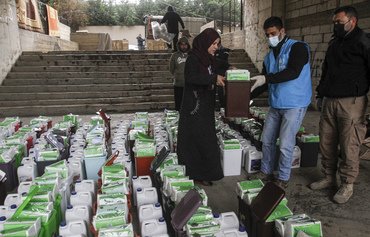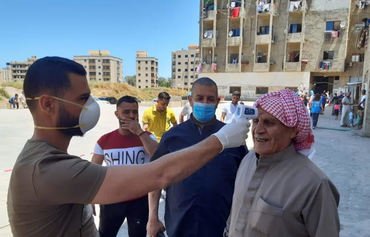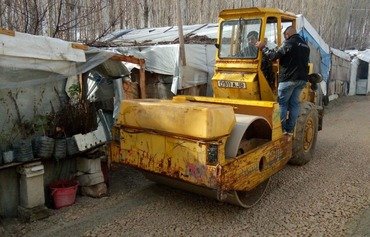The Lebanese government is taking preventive measures to control the spread of the novel coronavirus (COVID-19) in Lebanon, with special procedures in place for Syrian refugee camps.
As the deadly virus started to spread throughout the world, Prime Minister Hassan Diab on February 2nd formed a committee to follow up on preventive measures to fight the outbreak.
Subsequent measures included travel restrictions, school and restaurant closures, and the temporary closure of all entertainment venues such as cinemas and nightclubs.
On March 15th, President Michel Aoun announced a "medical state of emergency" and on March 21st the prime minister called on citizens to observe a "self-imposed curfew".
![Sawa for Development and Aid organised coronavirus awareness campaigns in Syrian refugee camps in Bar Elias and Saadnayel in Lebanon. [Photo courtesy of Sawa for Development and Aid]](/cnmi_am/images/2020/03/26/23128-Syrian-Refugees-Lebanon-600_384.jpg)
Sawa for Development and Aid organised coronavirus awareness campaigns in Syrian refugee camps in Bar Elias and Saadnayel in Lebanon. [Photo courtesy of Sawa for Development and Aid]
![A Lebanese GDGS team took part in disinfecting Syrian refugee camps in the northern Bekaa, including the al-Qaa and Hermel camps, in co-operation with local municipalities. [Photo courtesy of Lebanese General Directorate of General Security]](/cnmi_am/images/2020/03/26/23125-Syrian-Refugees-Lebanon-600_384.jpg)
A Lebanese GDGS team took part in disinfecting Syrian refugee camps in the northern Bekaa, including the al-Qaa and Hermel camps, in co-operation with local municipalities. [Photo courtesy of Lebanese General Directorate of General Security]
The restrictions apply also to Syrian refugees living in Lebanon, to safeguard camp residents and host communities.
Municipalities, in co-ordination with local civil society organisations, camp officials and international organisations are implementing preventive measures that include awareness campaigns and disinfection of camps.
Minister of Interior and Municipalities Mohammed Fahmi has asked the UN High Commissioner for Refugees (UNHCR) for assistance carrying out disinfection operations in refugee camps.
He also asked for help in distributing cleaning and sanitation materials to the refugees, and having doctors conduct periodic medical exams to fight the spread of the virus.
Meanwhile, as of March 22nd, teams from the General Directorate of General Security (GDGS) National Security Department have carried out disinfection campaigns in 72 camps in the Bekaa Valley, Mount Lebanon, Akkar and South Governorate.
Awareness campaigns
Authorities are implementing measures to counter the spread of COVID-19 in the town of Arsal, which hosts the largest concentration of Syrian refugee camps in Lebanon, housing more than 70,000 refugees distributed among 130 camps, according to Arsal Mayor Bassel al-Hujairi.
This is in addition to 1,500 families living in residential homes.
"The municipality is implementing the strict procedures issued by the Ministry of Health and the government and following their directives, including the procurement of thermometers and disinfection of the town, refugee camps and tents," he told Al-Mashareq.
"We will complete the disinfection of all tents once we receive [more] disinfectant materials from the UNHCR," he said.
"We closed the entrances to Arsal and launched awareness campaigns using loudspeakers about the measures that must be followed, such as the ban on gatherings, hygiene and sterilisation," he said.
"We do not have the medical tools needed to treat infections, so we are intensifying preventive measures with the help of a number of Syrian volunteers," al-Hujairi said.
The Voice of Syrian Refugees in Lebanon committee "conducts daily awareness campaigns in Arsal camps and distributes prevention instructions to the refugees on how to limit the spread of the coronavirus", said Abu Ahmed Sabeea, an official with the committee.
"To date, the campaign has covered 87 camps and it was observed that all the camps are complying with the Ministry of Health's instructions," he told Al-Mashareq.
Sabeea appealed to the UNHCR and other local and international relief organisations to "provide sterilisation materials, detergents, heating materials and food to the refugees in Arsal".
Developing emergency plans
Omar Abdullah, an official with Sawa for Development and Aid, said his organisation took immediate action to safeguard the refugee population.
"Once the Lebanese government announced the first case of coronavirus infection on [February 21st], the organisation developed a basic emergency plan to limit the spread of the virus," he told Al-Mashareq.
The emergency plan includes the dispatch of teams trained by the Red Cross on preventing the spread of the coronavirus to camps in Bar Elias and Saadnayel to conduct awareness workshops and distribute educational pamphlets, he said.
Sawa also "distributed food rations, hygiene and sterilisation materials in the most needy camps in Bar Elias and Saadnayel to prevent the refugees from leaving them, and enforced the directive issued by the Lebanese government on public gathering and social distancing", Abdullah said.
Sawa has developed plans to fight the virus should it arrive in the camps, he said.
"The first step calls for continuing the distribution of food rations and sterilisation and hygiene materials since the refugees are required to self-quarantine in their tents," Abdullah said.
Isolation areas will also be established to handle potential infection cases.
International organisations focused on refugees
The health of the refugees and their host communities "is one of UNHCR's top priorities and the focus of its efforts related to the prevention and response to the coronavirus pandemic", said UNHCR public information officer Lisa Abu Khaled.
UNHCR, in co-operation with the World Health Organisation and UNICEF, "launched preventive awareness campaigns on hygiene at an early stage in places where refugees go to receive services, gather and reside", she told Al-Mashareq.
They also raised awareness about ways to request a test.
Abu Khaled explained that UNHCR "disseminates all information to all refugees in Lebanon via text messages and media and social media campaigns, and has closed down community service and reception centres in accordance with the government's guidance on limiting gathering".

![The Voice of Syrian Refugees in Lebanon committee launched an awareness campaign about COVID-19 prevention in the Arsal camps, and distributed instructional pamphlets provided by the Lebanese army. [Photo courtesy of Voice of Syrian Refugees in Lebanon]](/cnmi_am/images/2020/03/26/23126-Syrian-Refugees-Coronavirus-600_384.jpg)






